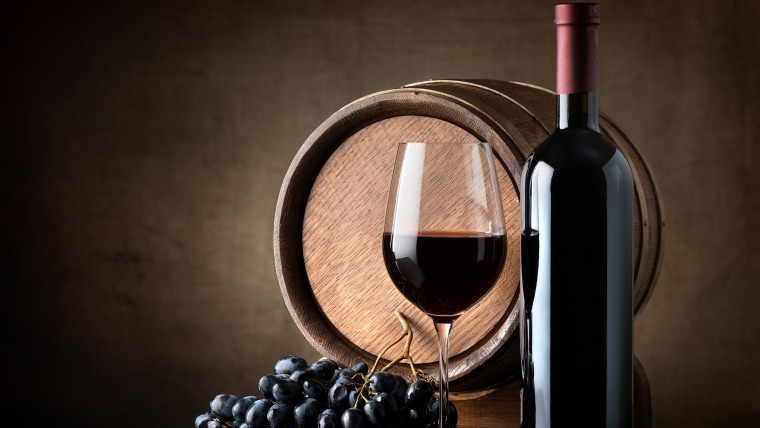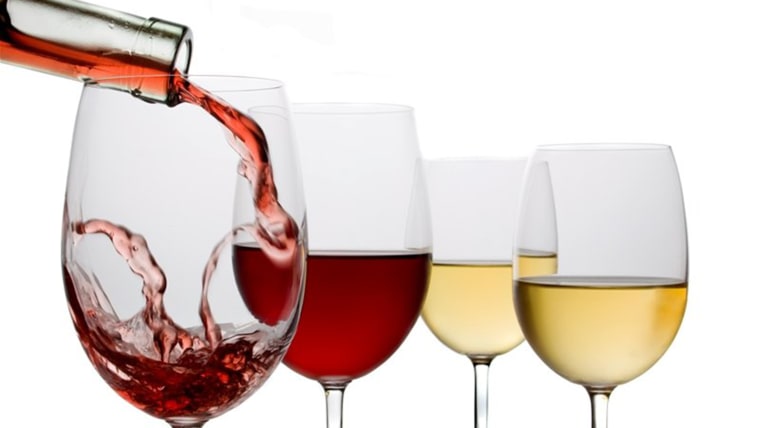As New Year's Eve approaches, the holiday parties will be flowing with red, white, and bubbly.

But which wine or Champagne not only tastes best, but may actually be good for you — and leave you without a headache in the morning? Experts say that while red wines trump whites when weighing overall health benefits, drier white wines like Rieslings or Sauvignon Blancs have perks of their own.
“If you’re going to go out and buy any wine and you’re looking for something healthy, go with a pinot noir,” said Leroy Creasy, Ph.D., Professor Emeritus at Cornell University College of Agriculture in New York who has studied the science of grapes and health benefits in wine for over two decades.
Creasy found that many varieties of red wine, especially pinot noir, contains a greater amount of the plant compound resveratrol than is found in white wine. Studies have indicated resveratrol contributes to lower cholesterol, a reduced risk of blood clots and general longevity.
Recent studies on the bodily boosts of sipping reds or whites have focused on the specific benefits wine has on cardiovascular disease, said Gary Pickering, professor of wine science at Brock University in St. Catharines, Ontario.
"Moderate and regular consumption of wine — particularly red wine—does, indeed, associate with many health benefits," Pickering said.
And here's a happy note for New Year's Eve revelers: Several studies have associated Champagne consumption with beneficial cardiovascular, vascular and even brain performance, possibly due to its anti-oxidant properties, Pickering said.
When it comes to such upsides, however, not all alcohols are the same, he added. For example, a chronically high intake of beer or spirits has been associated with an increased risk of lung cancer.
Moderate consumption of red wine, on the other hand, has been linked by researchers to a reduced risk of cancer, Pickering said.
"One of the key words here is, of course, 'moderate,'— high, chronic intake of alcohol, in any form, associates with many adverse health outcomes," Pickering said. "This is partly why there has been such limited advocacy or even recognition of the concept of ‘wine-as-medicine’ amongst health systems and educators, despite the compelling evidence ... of its truth."
Keith Wallace, a Philadelphia-based sommelier and president of The Wine School, a wine education program in Philadelphia, says red wines are beneficial because "they’re fermented on the skin" and have a lot of antioxidants and tannins. Tannins are chemical compounds found in plants and fruit skins that give wine a bitterer, more complex taste. They've also been linked to the annoying red wine headache.
“It’s biologically true for some people, that tannins in red wine may offer hangovers, so they should avoid red wine if they’re sensitive to tannins,” said Madelyn Fernstrom, TODAY health and nutrition editor.
Fernstrom recommends if you’re looking for something fizzy and festive, to stick with Champagne. “And much more economical,” she said, “is sparkling white wine.”
Keri Glassman, a New York-based nutritionist and founder of The Nutrition School, a nutrition practice and health and wellness brand, recommends choosing your favorite wine, regardless of the type, and sticking to the American Heart Association’s serving recommendations: no more than two drinks daily for men and one drink for women. A single drink is 5 ounces of wine, the same as a 1.5 shot glass or a 12-ounce bottle of beer.
Adding a splash of seltzer to any wine stretches your drink without adding calories. And it may help avoid that headache the next morning.
TODAY.com contributor Bill Briggs contributed to this report
